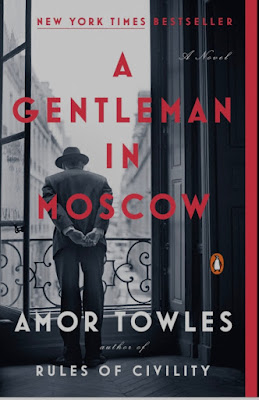A Gentleman in Moscow: A Novel by Amor Towles - 2016 - 463 Pages
A New York Times Best Seller
““Who will save Rostov from the intrusions of the state if not the seamstresses, chefs, bartenders, and doormen? In the end, Towles’s greatest narrative effect is not the moments of wonder and synchronicity but the generous transformation of these peripheral workers, over the course of decades, into confidants, equals, and, finally, friends. With them around, a life sentence in these gilded halls might make Rostov the luckiest man in Russia.” —The New York Times Book Review
“This is an old-fashioned sort of romance, filled with delicious detail. Save this precious book for times you really, really want to escape reality.” —Louise Erdrich
A Gentleman in Moscow might be the perfect lock
down novel. I loved this book and was sad when it ended, feeling I was parting company with people I had come to care about.
The central character is Count Alexander Ilyich Rostov, born in St Petersburg on October 24, 1889 into a very aristocratic wealthy family. His parents died of Cholera when he was 11 a Grand Duke became his guardian. Rostov had every reason to think he would live in comfort and luxury rhe rest of his life as an entitlement of his aristocratic birth. Rostov was very close to his sister Helena. When her heart was broken by another aristocrat, Rostov wounded him with a pistol. His grandmother sent him to Paris. He returned to Moscow in 1917, after the Revolution and was staying in his suite in The Grand Metropolitine Hotel when he was arrested. The charge was that he was a social parasite. He was brought before a Bolshevik tribunal and expected to receive the death penalty. He escapes this penalty as he is wrongly thought to be author of a famous poem. Instead he is sentenced to House Arrest for life in the hotel.
Escorted back to the hotel by the police, his first shock is the loss of his big suite. He must move into a very small room. He can take only some of his furniture and large collection of books. (There are lots of references to Russian literature, the count has read Anna Karenina at least ten times,that added a lot to my pleasure in reading). In the legs of his uncle’s desk he finds a hoard of gold coins big enough to sustain him for a long time. The Count is not arrogant but he grew up with expectations that are dashed now. Some people still call him by the now improper term of Count. Others try to denigrate him as an enemy of the people. He has the freedom of the hotel but will be executed if caught outside. The plot does turn on relationships he forms. We learn about his past. He becomes a father to a young girl left by her mother when she follows her husband to a labor camp. The girl becomes a musical prodigy. He is a very good father, totally devoted. He has a romantic relationship, though an odd one, with a Russian movie actress.
The hotel is the setting of big government meetings. We meet numerous big names of the period. When the count’s money gets low he eventually becomes head waiter at the high end hotel restaurant. There are lots of sumptuous descriptions of food.
We follow the Count for 32 years. The ending is very exciting. We see how his reading helped him get through difficult transitions. He became an avid reader of an edition of the essays of Michel de Montaigne he inherited from his uncle. ( Note to self, maybe the time has come for me to follow his example.)
There is just so much to like in this book. It also gives us much insight into life in post Czarist Russia from the activities in the hotel. Count Rostov is designated as a “former person”.. There are numerous interesting minor characters. Even Soviet bureaucrats have a human side.
“Amor Towles is the author of the New York Times bestsellers Rules of Civility and A Gentleman in Moscow. The two novels have collectively sold more than three million copies and have been translated into more than thirty languages. Having worked as an investment professional for more than twenty years, Towles now devotes himself fulltime to writing in Manhattan, where he lives with his wife and two children.” From Penguin Random House
There is a very interesting interview with the author set in the luxurious Russian Tea Room in New York City here
I look forward very much to reading his first novel Rules of Civility soon.
Mel u






7 comments:
I have this on my TBR pile, will have to read it soon. Thanks for the review.
A wonderful book. I consider this the best book I have ever read. The genius writing of the book, apart from what you have already said, is that Rostov's life inside is changing as the outer world changes. When political changes affects the ordinary person you see the changes in a different light. The ending is absolutely fantastic and suitable to the Rostov the survivor.
Great, Lisbeth, then I'm looking forward to it even more.
This sounds amazing: thanks for the recommendation! (The Louise Erdrich blurb helps too!)
Marianne. Thsnks for your comment, i hope you enjoy it.
Lisbeth. There is just so much to like in book. Just one example The conversations about The Marx Brorger’s Movies was so interesting
Buried in Print. - when i saw The quote from Louise Erdrich i did add it to my post hoping you woyld then read The book and i could read your thoughts on it.
Post a Comment